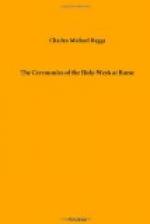[Sidenote: Palm-Sunday, Christ’s entry into Jerusalem.]
Palm-sunday is so called from the commemoration of our blessed Saviour’s entry into Jerusalem, when, according to St. John (XII, 13) “a great multitude took branches of palm-trees, and went forth to meet him, and cried: “Hosanna, blessed is he that cometh in the name of the Lord”. Thus when Simon Maccabee subdued Jerusalem, he entered it “with thanksgiving and branches of palm-trees, and harps, and cymbals, and hymns and canticles, because the great enemy was destroyed out of Israel”. 1 Macc. XIII. The entry of our divine Redeemer therefore was one of triumph: but it was also the entry of a king into his capital: for “many spread their garments in the way” (Mark XI, 8), as when Jehu was elected king, (4 Kings IX, 13), the Israelites spread their garments under his feet. Thus also Plutarch relates of Cato of Utica, that the soldiers regretting the expiration of his authority with many tears and embraces spread their garments, where he passed on foot.
Pope Julius II returning to Rome after the siege of Mirandola distributed palms to the Roman court at S. Maria del Popolo; and then rode in triumphal procession to the Vatican passing under seven arches adorned with representations of his extraordinary and heroic deeds[26].
[Sidenote: Sixtus V and Captain Bresca.]
When Sixtus V. undertook to erect in the Piazza di San Pietro the ponderous egyptian obelisk[27], which formerly adorned Nero’s circus at the Vatican, he forbade on pain of death that any one should speak lest the attention of the workmen should be taken off from their arduous task. A naval officer of S. Remo, who happened to be present, foreseeing that the ropes would take fire, cried out “acqua alle funi”. He was immediately arrested by the Swiss guards, as we see him represented in the small fresco in the Vatican library, and was conducted before the Pontiff. Sixtus shewed that his severity was based on justice; for instead of punishing the transgressor of his orders, he offered him the choice of his own reward. They who have observed the great abundance of palms which grow in the neighbourhood of S. Remo, on the coast between Nice and Genoa, will not be surprised to hear, that the first wish of the gallant captain was to enjoy the privilege of supplying the pontifical chapel with palms. The Pope granted him this exclusive right and it is still enjoyed by one of his family.
[Sidenote: Return of Pius VII to Rome.]
When the meek and benevolent Pius VII was returning to Rome from exile and captivity, Dr. Bresca, one of the captain’s descendants, contrived, though not without great risk, to convey to Rome the choicest palms of S. Remo and Bordighera. At the house of his friend Viale half a mile outside the Porta del Popolo, he assembled twenty five orfanelli dressed in their white cassocks, and forty-five verginelle. When the carriage of the beloved Pontiff approached,




